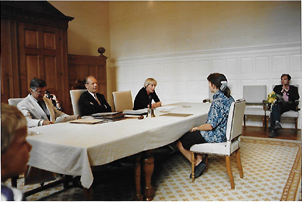Alumni interview: Five lessons from the career of truth-telling expert Riekje Stokes

Riekje Stokes (56) studied psychology and specialized herself in psychological interviewing. Now she has her own company, Stokes Interrogation Strategy, and she trains, coaches and advises professionals engaged in truth-finding communication. Her clientele is broad: from the police to municipalities and from investigation services of ministries to fraud departments of insurance companies. All of them knock on Riekje's door because they want to become better at finding the truth.
Interview: Demi Tiemes & Henny Veenstra / Text: Beau Oldenburg
1. Create your own path
"When I started studying psychology in 1983, it wasn't easy at first. I am a rather practical person and found the things we were learning difficult to concretize. I even doubted whether I wanted to continue with the study. But my fellow students after two years recommended me to sign up for a practical psychological interviewing, I was convinced. I loved it and thought: if this is what it's going to be like, then it's going to be alright!
From that moment on I started doing as many practical things within my study as possible. I was hired as a student assistant by Professor Gerrit Lang - a pioneer in the field of psychological interviewing - and together with the other student assistants I developed and organized training sessions for, among others, psychology students, theology students and future doctors. I was also part of the Higher Education for the Elderly project (HOVO) run by gerontologist Cees Tempelman. These experiences ultimately ensured that I did not just study but that I also really learned a profession: the trainer profession."
2. The truth is important
"I have had my own company for a number of years now and I train, coach and advise people in truth-finding communication. Among other things, I work a lot with investigative agencies. In that work, the truth is not only extremely important for society but also for the relatives. Often their fantasies about what may have happened are worse than the worst reality. If relatives do not know the whole story, their fantasies are without boundaries.”"
3. People who have committed a crime also have a conscience
"It is often thought that people who have committed a serious crime have no conscience. I disagree and always say: they have their own conscience. That is sometimes very different from how we see it, but they do have it. The trick is to find out how their conscience is reasoning, where their boundaries, if any, lie, and what drove them to commit the crime. A suspect is a human being, sometimes with a career similar to mine but at the other end of the spectrum, the illegal one.
I have been involved in about 150 cases and only once have I met someone where I found it difficult to see the human being. This man had horribly abused and killed a young girl. In the interrogations he was not concerned with the victim, he was only concerned with himself. He ended up getting 30 years in prison and was also sent to a psychiatric hospital (TBS)."

4. Dare to deviate from the book
"Since the Posthumus report, which critically examined the Schiedammer Park murder, the focus on the use of protocols and guidelines during interrogations has increased. Protocols provide a useful blueprint, but their users sometimes forget that they are tools and not an end in themselves. The human touch should be at least as central. Experience, feeling and intuition certainly play a role as well."
5. Do what you preach
"This premise is central to what I do, whether it's providing training, consulting or coaching. Openness, transparency and honesty, no snags or hidden agendas. If you can't be true to yourself, you can't be true to the other. If you've made truth-telling your profession, you can't afford to be fake."
| Last modified: | 12 October 2021 4.10 p.m. |
More news
-
16 May 2024
KNAW appoints Mladen Popović and René Veenstra as members
Professor Mladen Popović and Professor René Veenstra have been appointed members by the Royal Netherlands Academy of Arts and Sciences (KNAW).
-
01 May 2024
Behavioral Scientist Carsten de Dreu Appointed as Professor at the University of Groningen
The University of Groningen is pleased to announce the appointment of renowned social and behavioral scientist Carsten de Dreu as research professor at the UG.
-
09 April 2024
Kirsten van den Bosch: 'Connecting students with the work field really is achievable in every programme'
Dr Kirsten van den Bosch en her team won the Best Practice Award 2024 with their initiative to connect students with organizations to solve real problems within Academic Learning Communities.
